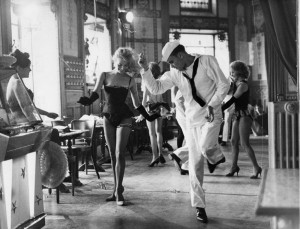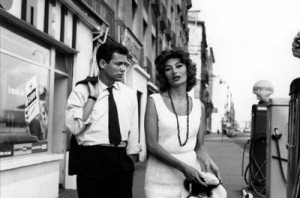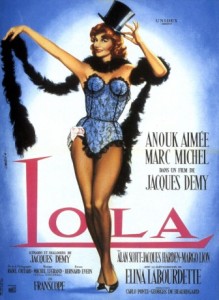Lola (Jacques Demy, France, 1961, 90 min)
Wisconsin Film Festival, Friday April 4, 12:15pm & Tuesday April 8, 5pm»
Lola deviates from the normal into the unreal. It starts with one man sulking about his boring existence and ends two days later with every character’s life significantly altered. Throughout the film the characters continuously cross paths with one another, and their lives become interwoven into a seemingly small world. This coincidental nature gives the story a fantastical feel. The film is like a dream, or perhaps a compilation of past memories. It is as if the memories of past lovers, of childhood, and of a fling with an American sailor are superimposed onto one another so that everything takes place within two days. Though these encounters are not necessarily happy, they all produce a strong feeling of sentiment. This feeling, along with the strange occurrences throughout—like the random appearances of a mysterious man in a luxurious Cadillac—makes watching Lola a wondrous experience.
Like many French New Wave films, Lola does not have a strictly conventional style and actually resembles a low-budget production in many respects. But the unconventional style is perfect for the fantastical nature of the film. One example is the cinematography, especially the use of overexposed lighting throughout many of the scenes, where the light from a window floods the frame, blending people’s faces into the background and suggesting a sense of flashback. The on-site location, the shaky camera movement and the lack of conventional exposition all work in a similar way. When memories play out in our heads, they do not appear like Hollywood movies but more so resemble a combination of home videos and dreams.
 Jacques Demy made films that feature small groups of characters encircled by an unusual world. Lola is no exception and holds many similarities to Demy’s other films, like women having wacky eyebrows or the film borrowing elements of musicals. Not only are these elements specific to Demy, but they also add to the fantastical feel of the film. Strange eyebrows and dance numbers aren’t normally encountered in daily life. For Lola, breaking into songs is somewhat realistically motivated since Lola is a performer, but it is more likely incorporated to make the plot seem extraordinary which adds spectator pleasure. And it is pleasurable to watch Lola sing a sexy song about herself.
Jacques Demy made films that feature small groups of characters encircled by an unusual world. Lola is no exception and holds many similarities to Demy’s other films, like women having wacky eyebrows or the film borrowing elements of musicals. Not only are these elements specific to Demy, but they also add to the fantastical feel of the film. Strange eyebrows and dance numbers aren’t normally encountered in daily life. For Lola, breaking into songs is somewhat realistically motivated since Lola is a performer, but it is more likely incorporated to make the plot seem extraordinary which adds spectator pleasure. And it is pleasurable to watch Lola sing a sexy song about herself.
Another surreal moment in the film is when Roland is offered a dubious assignment. This scene stands out among the rest; it is marked by a change in tone and a change in the path for Roland. Playing slightly before the scene, menacing music clues us in on the illegal activity that’s about to happen. Roland enters the barbershop and is approached by a woman with very expressive eyebrows. He insinuates that a job is possibly available, and a large man leads him into a cubicle hidden by a curtain. In a very dry demeanor, he lays out the job to Roland quickly and ambiguously. He points to a map, takes out a briefcase, and tells him that it is in his best interest to accept the assignment. A deadline is then created for Roland: he leaves France in two days to deliver the secretive suitcase.
 But then he runs into Lola, and Roland is torn between the job he has accepted and resurfaced past feelings. Roland complicates Lola’s already complex situation. We see her with Roland, with an American sailor, with her son and all the time she hopes for the return of her husband. The characters’ goals and situations conflict with one another, and the truths about the harshness of reality are exposed. We feel for each one of the characters’ complex lives but the strong sentimental feeling for the memory-like interactions pushes the plot into a relatively upbeat direction. While watching Lola, I felt a fondness for each character and each encounter, a similar fondness that would manifest when remembering a first love.
But then he runs into Lola, and Roland is torn between the job he has accepted and resurfaced past feelings. Roland complicates Lola’s already complex situation. We see her with Roland, with an American sailor, with her son and all the time she hopes for the return of her husband. The characters’ goals and situations conflict with one another, and the truths about the harshness of reality are exposed. We feel for each one of the characters’ complex lives but the strong sentimental feeling for the memory-like interactions pushes the plot into a relatively upbeat direction. While watching Lola, I felt a fondness for each character and each encounter, a similar fondness that would manifest when remembering a first love.
